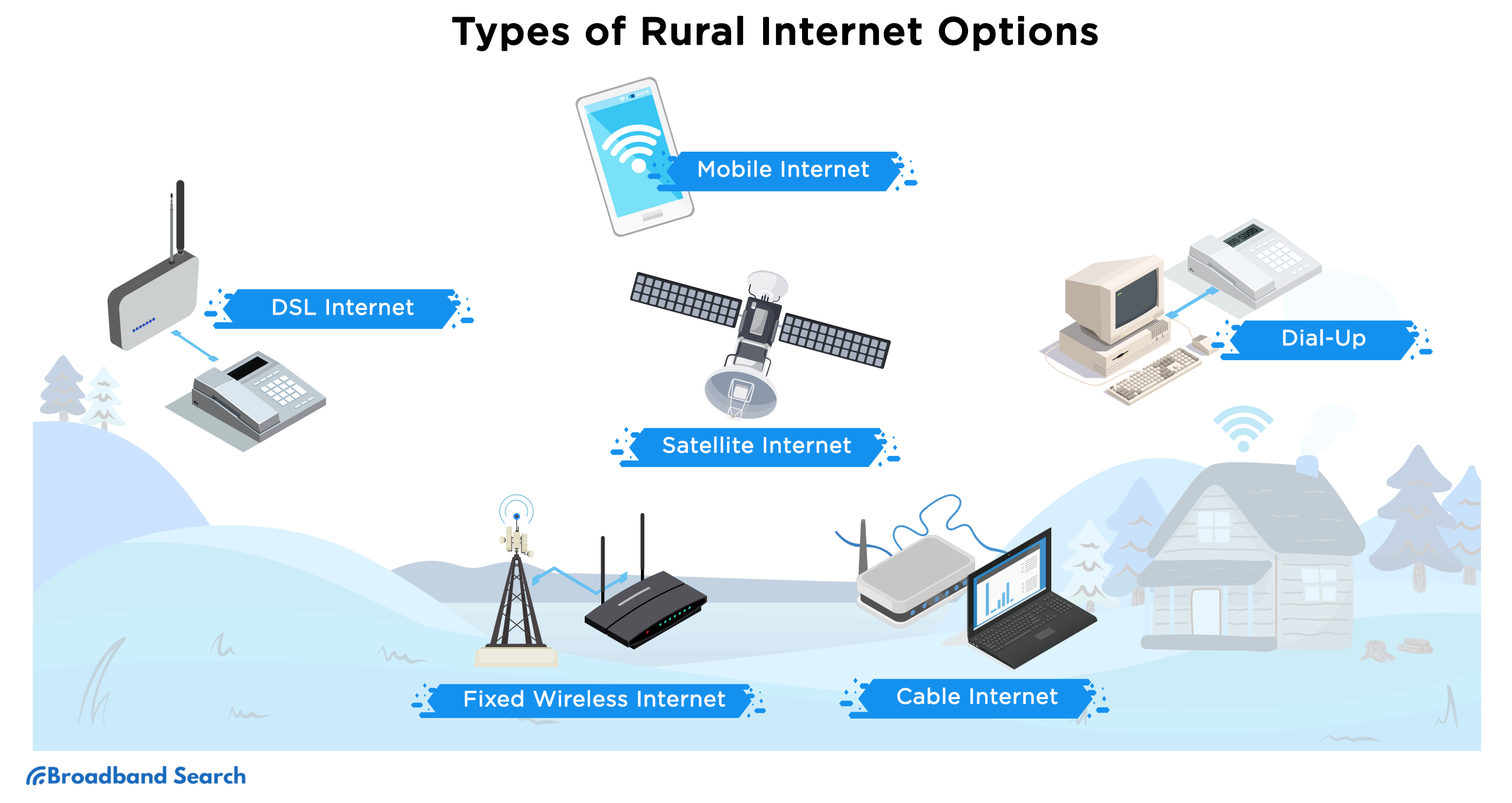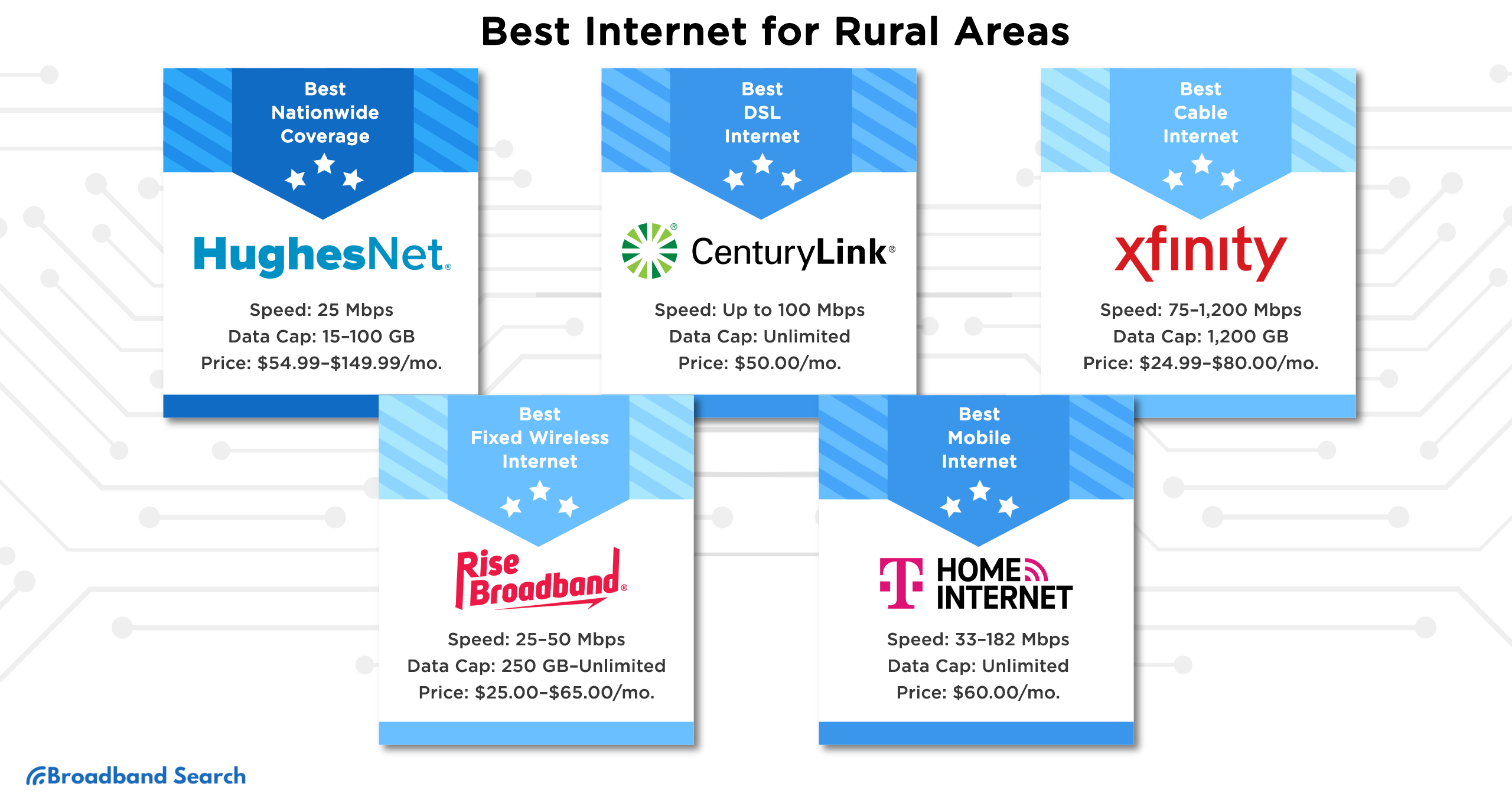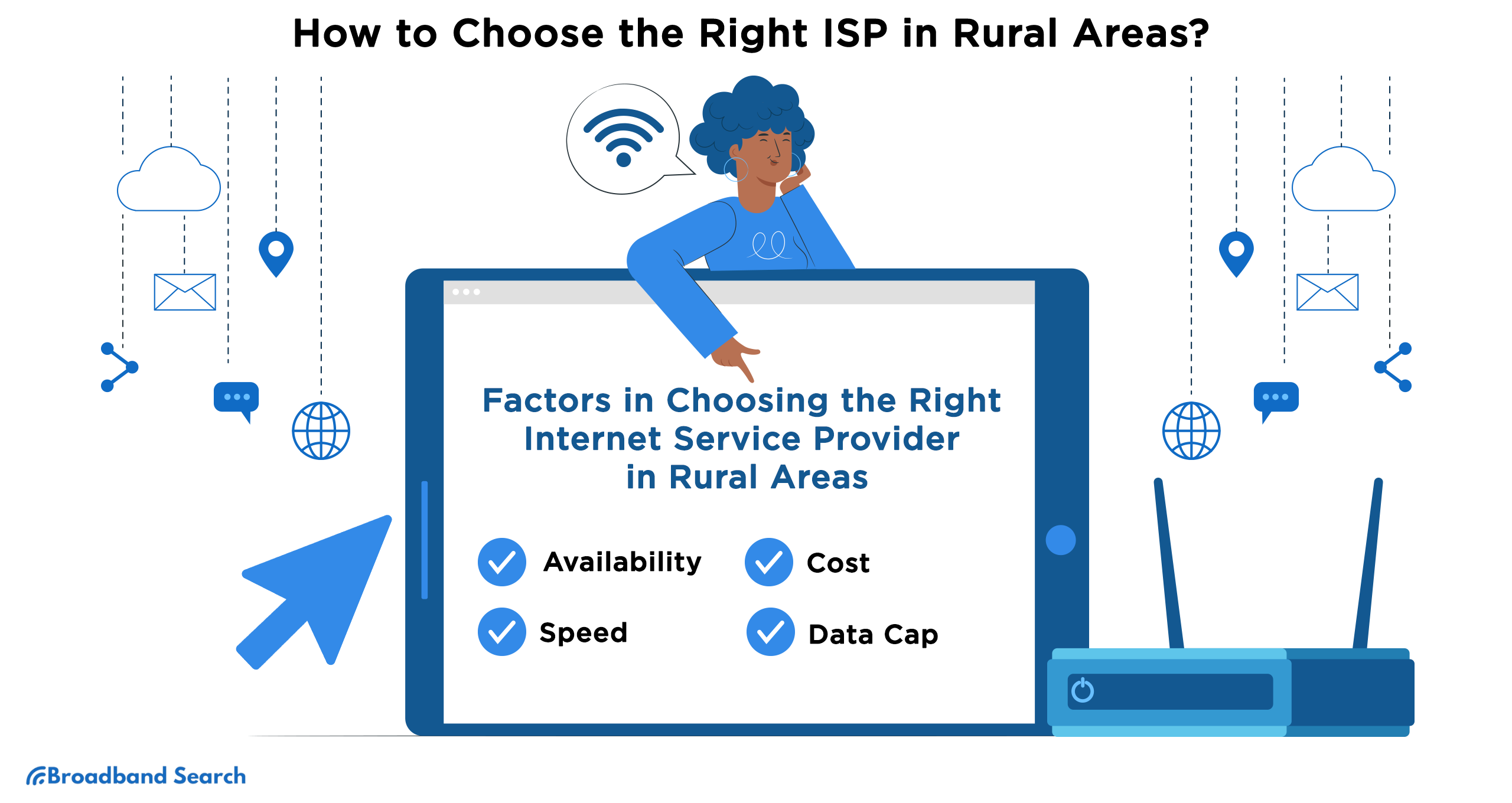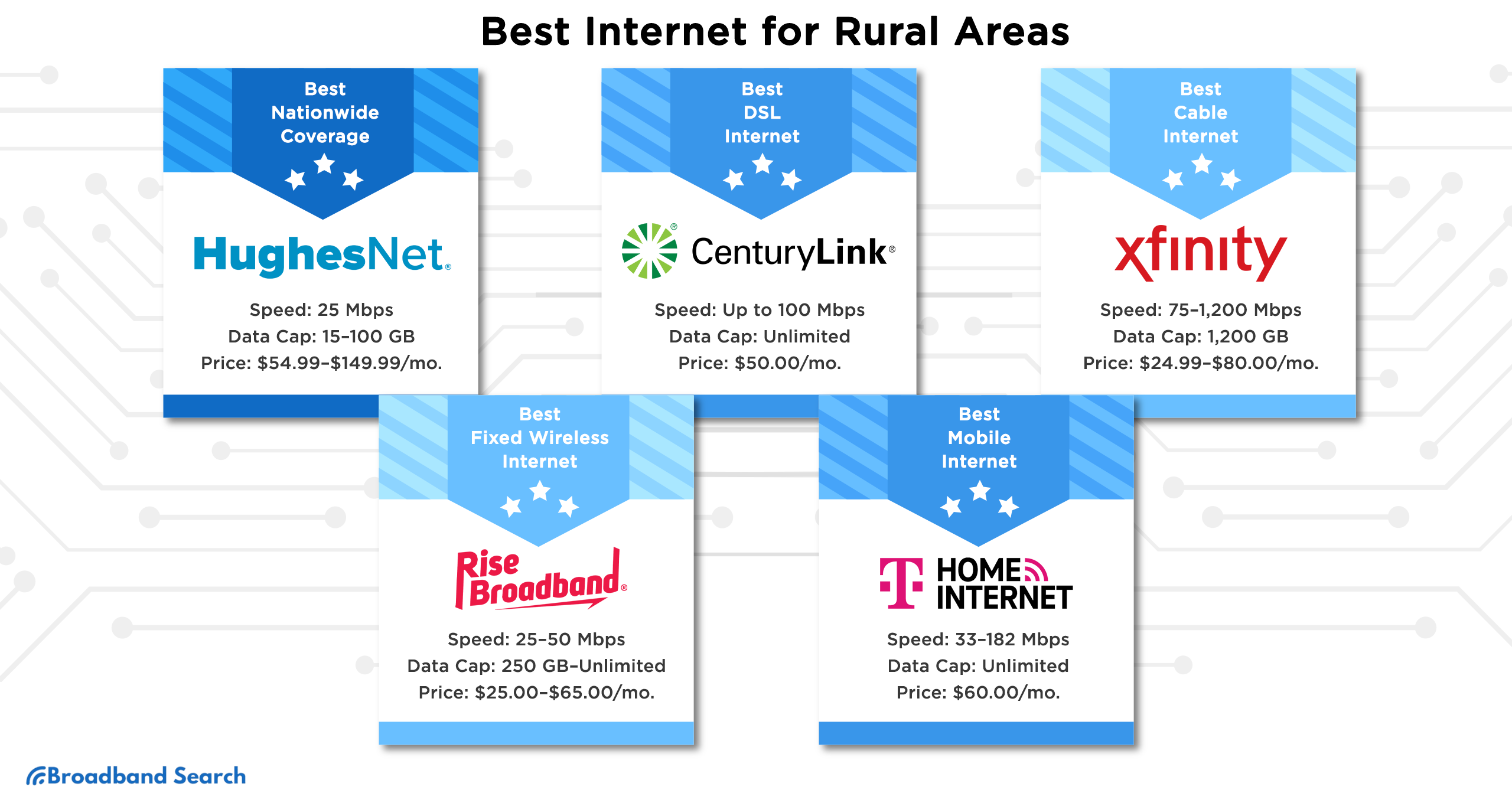High-speed internet has become an essential part of our daily lives. It's used for everything from staying in touch with loved ones to completing schoolwork and enjoying entertainment. Unfortunately, for many people living in rural areas in the United States, accessing reliable internet can be a challenge.
Despite progress in improving broadband infrastructure, the Federal Communications Commission (FCC) reported that around 14.5 million Americans in rural areas still lack internet access. This issue affects individuals, families, businesses, and entire communities. In this article, we'll explore the best options to get the best internet service provider that fits your needs and budget.
Types of Rural Internet Options
Internet access is essential, but not all connections are created equal. Take a minute to review the following types of internet connections available to help you choose the best option to go for:

Satellite Internet
Satellite internet uses satellites in orbit to send and receive data signals. The user's computer sends data to the satellite, which relays the information to a ground station. From there, the data is sent to the internet and vice versa.
Advantages:
- It is available in remote areas where traditional wired internet services may not be accessible.
- The internet service is not affected by physical infrastructure and does not require ropes or wires to be installed.
Disadvantages:
- Tends to have higher latency, which can result in a slower internet experience.
- Weather conditions can cause a loss of internet connectivity. And satellite internet plans may come with data usage caps, leading to additional charges if the user exceeds the allotted data usage.
DSL Internet
DSL is a popular and cost-effective internet option for rural areas where cable or fiber optic internet is not available. It works by transmitting digital data over existing telephone lines while allowing voice calls to be handled simultaneously. Though DSL may not offer the highest speeds, it remains a reliable option for those with low to moderate internet usage needs.
Advantages:
- It is widely available in many areas, and its infrastructure is already in place, making it a more affordable option for many users.
- It offers lower latency, which can provide a better user experience when streaming videos or playing online games.
Disadvantages:
- The internet speed is limited by the distance between the user and the provider, which can cause slower speeds for users far away from the provider.
- The quality of the internet connection can also be affected by the phone line quality, which can cause disruptions and slow speeds if the cable is old or damaged.
Cable Internet
Cable internet is a service that uses the same coaxial cables that deliver cable television to transmit data signals. The service is provided by cable television providers, who use a modem to send and receive data signals between the user's device and the internet.
Advantages:
- It provides higher speeds than other internet services.
- The infrastructure for cable internet is already in place in many areas, making it a widely available option for users.
Disadvantages:
- The internet connection quality can be affected by network congestion, which can cause slower speeds during peak hours.
- Cable internet plans may come with data usage caps, resulting in additional charges if the user exceeds their allotted data usage. And the cost of cable internet service may be higher than other internet services.
Fixed Wireless Internet
Fixed wireless internet is a service that utilizes radio signals to provide high-speed internet connectivity. The service provider installs an antenna on the user's rooftop, which receives a signal from a nearby wireless tower. The call is then transmitted to a modem, which provides an internet connection to the user's home.
Advantages:
- It is easy to install and doesn't require extensive infrastructure like fiber-optic cables, making it more affordable for many users.
- The service is available in remote areas where traditional wired internet services may not be accessible.
Disadvantages:
- The internet connection quality can be affected by weather conditions and physical obstacles like trees or buildings that block the signal.
- The service may experience network congestion during peak usage hours, resulting in slower internet speeds for users. Additionally, fixed wireless internet plans may come with data usage caps, leading to additional charges if the user exceeds the allotted data usage.
Mobile Internet
Mobile internet is a service that allows users to access the internet using their mobile devices. Mobile network operators provide internet services and utilize cellular technology to transmit data. It is wireless and requires no physical infrastructure such as cables or wires.
Advantages:
- It is highly portable and convenient, allowing users to access the internet on the go.
- The technology behind mobile internet is constantly evolving, providing faster speeds and better coverage to users.
Disadvantages:
- Network congestion can affect internet speeds during peak hours. And environmental factors can also affect signal strength and quality.
- Mobile internet plans often come with data usage caps, which can incur additional charges if the user exceeds their allotted data usage. Environmental factors such as buildings, trees, and other obstacles
Best Internet for Rural Areas
Accessing reliable high-speed internet has become increasingly essential, and rural communities often need help with connectivity. Luckily, in recent years, internet service providers have started offering tailored solutions to meet the unique needs of rural communities.
These solutions can range from satellite and fixed wireless options to mobile broadband and DSL services, all of which can provide reliable internet access for those living in rural areas. Let's take a closer look at the best internet options available for rural areas--focusing on their speeds, costs, and data caps.

Best Overall Internet Provider for Rural Areas: EarthLink
Finding fast, secure internet in rural areas remains a significant challenge for many Americans. Urban areas enjoy multiple high-speed options, but rural communities often face limited choices and slower connections that can't keep up with modern demands.
- Prices range from $49.95 to $189.95 per month
- Speeds range from 25 Mbps to 5 Gigs
EarthLink stands out as the best choice for rural internet thanks to its availability and multiple connection types. As the largest provider of rural internet in the United States, EarthLink offers coverage that fits a variety of rural lifestyles and connectivity needs.
EarthLink is committed to bringing reliable internet to underserved areas. Its network supports everything from remote work and video conferencing to 4K streaming and online gaming in areas that other major ISPs often overlook. With flexible plans, no data caps on many services, and competitive pricing, EarthLink makes high-speed internet accessible to rural communities nationwide.
EarthLink's Rural Internet Options:
- Fiber Internet - Lightning-fast speeds up to 5 Gigs with symmetrical upload and download speeds, ideal for heavy internet users and multiple device households
- Wireless Home Internet - High-speed connectivity using advanced cellular networks, featuring easy installation and wide availability in rural areas
- Satellite Internet - Dependable coverage reaching even the most remote locations, ensuring no rural area is left without internet access
EarthLink's dedication to rural connectivity means you have access to the same internet quality as urban areas, whether you're running a home business, attending virtual meetings, or streaming your favorite shows.
Ready to experience reliable rural internet? Check availability on EarthLink.net and explore which rural option fits your needs best.
Best Satellite Internet: HughesNet
HughesNet provides a reliable satellite internet service that is suitable for rural areas with limited connectivity options. They offer a range of internet plans to cater to different data usage needs, allowing customers to choose a plan that aligns with their requirements and budget.
- Prices range from $50 to $150 per month.
- Speeds range from 12 Mbps to 100 Mbps
- Uses satellite internet
- Flexible contract options
- Unlimited data
One of the best features of Hughesnet is its high data allowance, making it an excellent choice for internet activities such as video streaming and online gaming. Unlike other providers, HughesNet does not have hard data limits; once customers reach their data allowance, their speeds will be slowed down but won't incur extra charges. In addition, HughesNet customers can take advantage of the "Bonus Zone" feature, which offers additional data during off-peak hours from 2 am to 8 am.
The company provides customers with round-the-clock support, ensuring assistance is available whenever it's needed. With flexible options and a cost-effective service, HughesNet is an excellent choice for those seeking dependable internet access in rural areas.
Best DSL Internet: CenturyLink
CenturyLink offers a variety of plans for both DSL and Fiber internet services. Their plans come with different speeds and data allowances, and they do not enforce data caps on their internet plans, allowing customers to choose an option that meets their needs.
- Prices range from $50 a month and $65 a month; only 2 plans offered
- Speeds range from 100 Mbps to 940 Mbps
- Uses DSL and Fiber for data transmission
- No contract
- Unlimited data
For individuals who heavily utilize the internet, data caps are a critical consideration, and CenturyLink excels in this area. With CenturyLink's internet plans, customers are not subject to data caps, allowing them to utilize the internet without any concerns about surpassing their data limit and enjoy unlimited usage.
In addition, by offering a no-contract alternative and user-friendly internet service equipment, CenturyLink not only gives customers the freedom to switch plans or providers at any time but also simplifies the installation and utilization process.
Best Cable Internet: Xfinity
Xfinity presents a suitable choice for those living in remote areas who require fast internet service. With the most comprehensive coverage of coaxial lines compared to other providers, Xfinity extends its services to 40 states, with special focus on the Rockies region.
- Prices range from $24.99 to $80.00 per month
- Speeds range from 50 Mbps to 3 GB
- Uses cable to transmit data
- With contract
- 1,200 GB data allowance
Xfinity stands out for its flexibility in terms of contract and equipment options, allowing customers to tailor their internet service to their specific needs. The option to choose from different contract lengths or select a no-contract option is particularly beneficial for those who require flexibility in their internet service. Additionally, new customers can enjoy the convenience of Xfinity's complimentary installation service, and equipment expenses can be spread out into monthly payments, making it easier to manage internet costs.
Another noteworthy advantage of Xfinity is their unlimited data plan, which can alleviate concerns for heavy internet users regarding specific data caps on their plans. Though pricing may vary by location, Xfinity's unlimited data plan is an excellent option for those who require unrestricted internet access.
Best Fixed Wireless Internet: Rise Broadband
For residents in rural areas where DSL speeds can be as low as 2 Mbps or where satellite internet data caps may be too restrictive, Rise Broadband's fixed wireless internet service offers a practical and reliable solution. With fixed wireless technology delivering speeds of up to 50 Mbps, it presents an appealing option for customers seeking faster internet speeds.
- Prices range from $25 to $65 per month
- Speeds range from 25 Mbps to 50 Mbps
- Uses DSL and Fiber for data transmission
- No long-term contract
- Unlimited data
Rise Broadband's fixed wireless internet service offers flexible plan options without requiring a long-term contract, which enables customers to choose a plan that fits their specific needs and change or cancel it without incurring additional fees. While some plans may have data caps, they are typically not as low or restrictive as those associated with satellite internet, which can be as low as 10 GB per month.
Additionally, Rise Broadband's approach to data caps is different from some other providers who may charge extra fees once a customer reaches their data cap. Instead, Rise Broadband may slow down the connection speed after a data cap is reached, allowing customers to continue using their internet service without unexpected costs.
Best Mobile Internet: T-Mobile Home Internet
T-Mobile Home Internet is a wireless internet service that delivers high-speed connectivity to residential customers by utilizing T-Mobile's 4G and 5G networks. It's an excellent alternative for those in areas with limited connectivity, providing flexible and affordable options without data caps or long-term contracts.
- Solo pricing option at $50 per month
- Speeds range from 33 Mbps to 132 Mbps
- Uses a Cellular connection type
- No contract
- Unlimited data
T-Mobile Home Internet stands out for its affordability, as it offers an all-inclusive package that covers the cost of the gateway modem-router combo and installation. This makes it a cost-effective option for customers, as they don't have to worry about additional equipment expenses.
Although T-Mobile Home Internet offers impressive speeds of over 100 Mbps in many areas, speeds may vary in truly remote areas. Nevertheless, the service is a reliable option for customers seeking dependable and affordable internet service in rural areas. With a range of plans available, customers can choose the one that best fits their needs.
Factors to Consider Before Choosing Rural Internet
Living in rural areas no longer means sacrificing connectivity to the world. However, choosing the right rural internet service provider is critical since mistakes can prove to be costly. Before selecting a provider, it's important to consider various factors to ensure that you get the best value for money and with seamless connectivity.

Speed
The speed of internet connectivity can impact how quickly websites load, how smoothly videos stream, and how fast downloads occur. Internet Service Providers (ISPs) offer varying speeds that cater to the different needs of their customers. Here are some common internet speeds and what they are best for:
- 10-25 Mbps: This speed suits basic internet usage, such as browsing websites, checking email, and streaming standard definition videos. It is ideal for households with one or two users.
- 25-50 Mbps: This speed is best for households with multiple users who engage in basic internet activities like browsing, streaming music and videos, and video conferencing.
- 50-100 Mbps: This speed is recommended for households with several users engaging in online gaming, streaming HD videos, and downloading large files.
It's essential to strike a balance between speed and cost to avoid financial strain. Overpaying for internet speed that you don't require can unnecessarily strain your budget, while selecting an internet service that's too slow may result in additional charges or slow connectivity. Before choosing a provider, it's important to consider your entire household's internet usage.
Data Cap
To prevent unexpected charges and connectivity issues, it is crucial to choose a rural internet service provider that offers a data plan tailored to your needs. Activities such as video streaming, online gaming, and video conferencing require more data than browsing the internet or checking emails. Additionally, various connections have different data caps, which emphasizes the importance of selecting a plan that suits your requirements.
- Fixed Wireless: range from 50 GB to 500 GB per month.
- Satellite: ranges from 10 GB to 200 GB per month.
- DSL: ranges from 150 GB to 1 TB per month.
- Cable: ranges from 250 GB to 1 TB per month.
- Mobile internet: ranges from 1 GB to 100 GB per month.
Cost
Providing internet service to rural areas can be costly for ISPs due to limited infrastructure and customer distance. To accommodate this challenge, internet providers developed different infrastructure technologies. The cost of each technology depends on factors such as its accessibility in the given area, the type of technology, and its reliability and speed.
- Fixed wireless: The cost can range from $30 to $100 monthly.
- Satellite: The cost can range from $50 to $150 per month.
- DSL: The cost can range from $20 to $80 per month.
- Cable: The cost can range from $30 to $100 monthly.
- Mobile Internet: the price can vary from $20 to $100 per month.
The Bottom Line
In conclusion, finding the best rural internet service provider requires careful consideration of several factors, including speed, data caps, infrastructure technology, contract length, and pricing. It's important to remember that each household's internet usage needs are unique, and selecting a provider that aligns with those needs can save money and frustration in the long run.
Achieving reliable internet connectivity in rural areas can be a daunting task, but it's certainly possible with the right information on hand. Ready to explore the available options and learn which one suits your needs best? Check out this page to get started today.
FAQ
Is wifi worse in rural areas?
Rural areas have traditionally had worse internet access than urban areas. This is because it is more expensive to build infrastructure in rural areas, and there are often fewer potential customers. As a result, many rural residents have had to rely on dial-up, satellite, or mobile broadband connections, which can be slower and less reliable than other types of internet.
What are the barriers that prevent rural areas from getting access to Internet services?
Rural broadband networks are extremely costly and difficult to build, there aren't enough potential customers to make it economically feasible for providers, internet service maps are faulty and inaccurate, restrictive laws and regulations hamper independent and local efforts, and rural internet is often expensive, unreliable, and subjected to throttling. As a result, many rural residents are stuck with slow and insufficient Internet service.
How does slow internet affect students?
Students now rely on the internet for schoolwork, connecting with classmates and teachers, and even buying their books. When the internet is slow or unavailable, students can't complete their assignments and may fall behind in their classes. In addition, they can miss important social interactions with classmates that are crucial to their development. Finally, a lack of reliable internet access can prevent students from accessing critical resources like textbooks and other educational materials.
Does the internet cost more in rural areas?
Rural areas often have to pay more for internet access because it is more expensive to build the infrastructure in these areas. In addition, there are often fewer potential customers, which means providers can charge more for their services. As a result, many rural residents end up paying more for slower and less reliable service.
How can the Internet help developing countries?
The internet can help developing countries by providing access to information and education, connecting people with opportunities, and promoting economic growth. When people have access to the internet, they can learn new skills, start businesses, and find jobs. The internet can also connect people with essential services like healthcare and government assistance.

